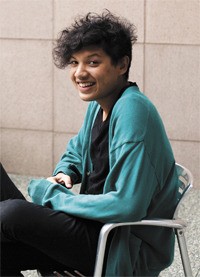For Islander Nathan Ma, the time he attended school on Mercer Island seems long ago.
He had forgotten that most of his would-be classmates would be graduating from high school on June 7. Instead, he was busy preparing for a final at the University of Washington, where he is a junior.
Ma never attended high school on Mercer Island. He never attended any high school. Instead, he entered the University of Washington in 2008, one of a dozen or so gifted youth accepted into a program designed just for students like him. He was 14 years old.
The Early Entrance Program is a two-step program for young students consisting of one year of Transition School, an intensive college preparatory program conducted by the Robinson Center for Young Scholars at the UW that leads to full-time enrollment at the university.
Ma had attended summer camps sponsored by the program as a fifth and sixth-grader. During eighth grade, he took the ACT test and was invited to apply. Applicants need to score at or above the 85th percentile on that test to be considered for the program. Ma does not remember his score. He does remember that the application process was extensive. There were several interviews and writing exercises. “It was intense,” he said.
Julie Lancour, the interim director of the Early Entrance program, said that Ma has been an excellent student. He represents exactly the type of student that they look for.
“Nathan has a great sense of the possible,” she said.
“He is an incredible young man in many ways,” she continued. “He has been a positive member of the program, a volunteer and a mentor to others.”
“I’d like to keep him around,” she laughed.
During the first year, there is an extensive support system for the students that follows them through the first year and beyond, including a special academic advisor and the program staff, their peers, and other resources. They live at home. Their parents are also a key part of the program’s success.
At the end of the first year, the students ‘graduate’ and can then enter the university as regular students. But none of these young scholars can really be considered regular.
The students in these programs aren’t afraid to take risks, Lancour said. They quickly leave high school behind. They are just fearless.
According to the program website, the most successful Early Entrance Program students are “motivated to fully develop their intellectual capacity, and are enthused to learn.” It is this combination of ability and strong self-motivation that is sought after in applicants.
Indeed, they want students to look at all the options that are made available to them.
“We don’t want any of them to walk across the stage at graduation and think, ‘I wish I would have…’” said Lancour.
As far as high school is concerned, Ma, the second oldest of four brothers, considers the question for a moment before he answers.
“I feel like I did not miss out on anything,” he said.
Tallish, lean and matter-of-fact about his accelerated journey through higher education, Ma appears unaffected by his gifts. But he is aware that he has been presented with great opportunities. He said he has tried to make the most of it. He said that it was probably good for him to be so young when he entered the program.
“If I would be leaving high school right now, I would probably be intimidated by college and all of the choices,” he said.
Yet, when asked how his parents might describe him, he answered, “adventurous.”
His twin majors of photography and psychology do not seem like an unusual pairing at all to him. “Each discipline informs the other,” he said.
Ma is a recipient of a Mary Gates Research Scholarship and was awarded a federal government stipend to help cover the cost of a trip to Indonesia this summer. There, he will conduct and document a population survey of the long-tailed macaques of Tinjil Island.
He has won other scholarships, he explained, including one from the Early Entrance Program, “to add to the money my parents have saved for my education.”
It has not been all that easy.
Ma does not have a driver’s license, but is not in a hurry to get one. He has had a long commute to campus on the 205 bus from Mercer Island. He lived near campus this past year.
In addition to his classes and research projects, he works 15 to 20 hours a week during the school year at a coffee stand on campus. “If I’m having a busy week, I’ll give up my shifts, and if I don’t have anything to do, I’ll pick some up,” he said.
In between his required classes and work hours, he has sought out learning opportunities. He has been part of research projects notably in animal psychology.
He has been a research assistant for the psychology department at the Woodland Park Zoo since the winter quarter of his freshman year. There, he has also added to his photography portfolio.
There is more. He squeezed in an Italian language class. He spent a summer quarter in Rome studying art history.
Ma, who turned 18 last November, will graduate in 2013 with a B.F.A. in Photomedia with distinction, a B.S. in Psychology (Animal Behavior) with distinction, and a minor in Art History. He will also graduate with college honors, which denotes he has completed the UW Honors Program’s graduation requirements.


